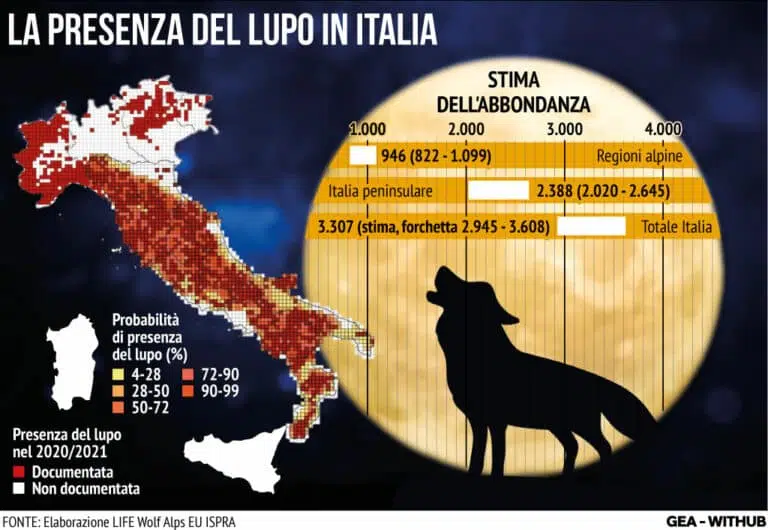Brussels – More than “Beware of the wolf,” “Wolf beware!” It is getting closer to revising the predator’s protection status proposed by the European Commission last December from “strictly protected” to “protected” species: member state ambassadors gave their green light today (Sept. 25). Now the confirmation by the ministers of the 27, meeting tomorrow for the EU Competitiveness Council, is a mere formality.
The adjustment of the protection status “will be an important step in addressing the challenges posed by the increasing wolf population while maintaining the goal of achieving a favourable conservation status for the species,” commented Adalbert Jahnz, spokesperson for the European Commission. With the downgrading to “protected species”, the now 20,000 wolves in Europe will move out of the inner circle of large carnivores protected by the Habitats Directive: the brown bear, the wolverine, the golden jackal, and the Eurasian and Iberian lynxes, for which there is a ban on deliberate killing and capture, as well as the deterioration or destruction of their breeding and resting sites in all EU territories.

European sources explain that member states will be given more flexibility to “deal with the most difficult cases of coexistence between wolves and communities in states that need it.” More room for trapping to culling, in any case already allowed by the Habitats Directive itself, allows derogating from obligations on large carnivores when measures to prevent or reduce predation risks are not enough. Reportedly, at COREPER (the body that brings together EU ambassadors), Italy supported the proposal, while only two countries opposed it, and four others chose to abstain. Not enough to block the decision made by a qualified majority. “We are waiting for formal approval by the Council, and then the EU will submit the proposal to the Standing Committee of the Bern Convention in time for the next meeting of the Committee, scheduled for the first week of December,” Jahnz announced.
Amending the international Bern Convention on the conservation of European wildlife and natural habitats, to which the EU and its member states are parties, is the “precondition for any change under EU law.” Only once the treaty has been amended can the European Commission amend the regime under the Habitats Directive.
The Convention is based on scientific data available at the time of the treaty negotiations in 1979. While the European Commission’s proposal is based on “requests that have been made to us by local and national authorities,” Jahnz pointed out, “as something necessary and useful to address the challenges posed by wolves. In September 2023, Ursula von der Leyen had invited the scientific community, local authorities, and all stakeholders to submit updated data on wolf populations and their impacts. On the basis of that “in-depth examination of the changing reality analysis,” Brussels proposed the downlisting of the species a few months later—in line with what the European Parliament called for as early as November 2022.
“A step forward that fills us with satisfaction. It is unacceptable that it has taken years to recognize a reality before everyone’s eyes,” commented the head of the Lega’s delegation in Brussels, Paolo Borchia. Fratelli d’Italia MEP Pietro Fiocchi reiterated the concept: “We are on the right track, and today’s result rewards the battles over downgrading that we have been conducting for a long time alongside Italian farmers.” The same Fiocchi who posed with a shotgun in posters for June’s European elections and former executive of the family company that produces ammunition.
Almost as playing defence, the European Commission spokesman pointed out that “the solution to all the problems posed by wolves also and above all lies in investment in appropriate damage prevention measures.” But according to WWF, the EU has taken “a grave decision that dangerously opens the door to wolf culls in Europe and ignores the call of more than 300 civil society organizations and hundreds of thousands of people who have urged governments to follow the recommendations of science and intensify efforts to foster coexistence with large carnivores through preventive measures.”
English version by the Translation Service of Withub


![La presidente della Bce, Christine Lagarde [Francoforte, 6 marzo 2025]](https://www.eunews.it/wp-content/uploads/2025/03/lagarde-250306-120x86.png)

![Un atomo. L'Ue punta sul nucleare di nuova generazione per il suo futuro energetico [foto: iStock]](https://www.eunews.it/wp-content/uploads/2025/04/atomo-120x86.jpeg)
